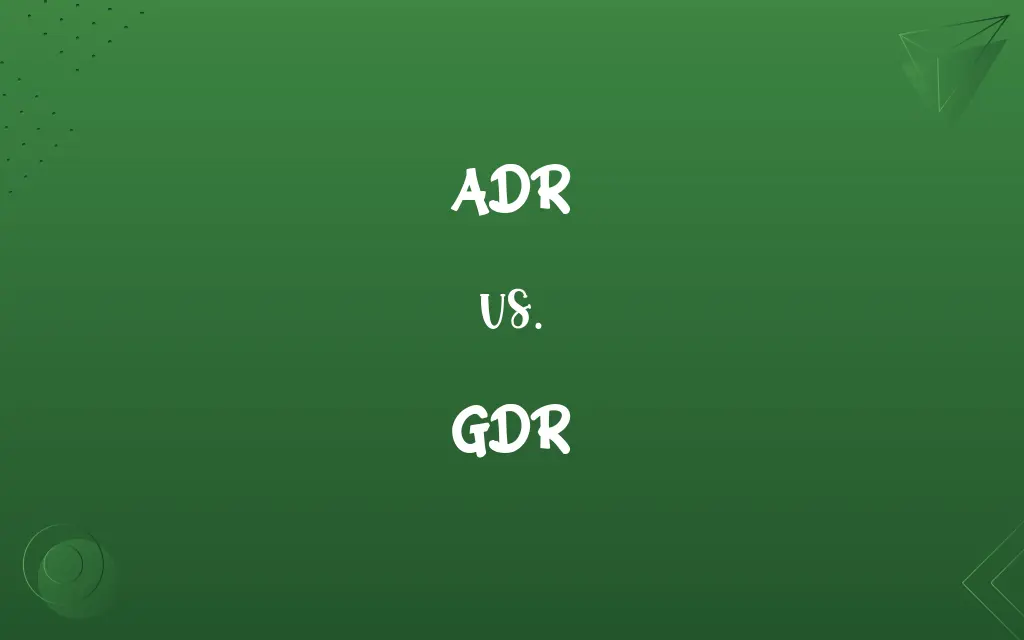ADR vs. GDR: Know the Difference

By Shumaila Saeed || Published on January 23, 2024
An ADR (American Depositary Receipt) allows U.S. investors to buy shares in foreign companies, while a GDR (Global Depositary Receipt) lets investors buy shares globally.

Key Differences
An ADR is a financial instrument used by U.S. investors to purchase shares in foreign companies, providing an easier way to invest in overseas markets. Conversely, a GDR is a similar instrument used globally, allowing investors from various countries to invest in foreign companies.
Shumaila Saeed
Jan 23, 2024
ADRs are typically traded on U.S. stock exchanges and are denominated in U.S. dollars, making them accessible to American investors. GDRs are traded on multiple international stock exchanges, and can be denominated in various currencies, broadening their appeal to a global investor base.
Shumaila Saeed
Jan 23, 2024
The primary purpose of an ADR is to facilitate the trading of foreign stocks in the United States, simplifying the process for U.S. investors. GDRs serve a similar purpose but on a global scale, allowing for cross-border investments with relative ease.
Shumaila Saeed
Jan 23, 2024
Each ADR represents one or more shares of a foreign stock or a fraction of a share. In contrast, each GDR represents a share of a foreign company's stock, and the specifics can vary based on the issuing company and the market.
Shumaila Saeed
Jan 23, 2024
While ADRs are governed primarily by U.S. market regulations and laws, GDRs are subject to the regulatory requirements of multiple countries, depending on where they are traded.
Shumaila Saeed
Jan 23, 2024
ADVERTISEMENT
Comparison Chart
Trading Location
Primarily in U.S. stock exchanges
Multiple international stock exchanges
Shumaila Saeed
Jan 23, 2024
Currency
Denominated in U.S. dollars
Can be denominated in various currencies
Shumaila Saeed
Jan 23, 2024
Regulatory Compliance
U.S. market regulations
Regulations of multiple countries
Shumaila Saeed
Jan 23, 2024
Purpose
Facilitates investment in foreign stocks by U.S. investors
Facilitates global investment in foreign stocks
Shumaila Saeed
Jan 23, 2024
ADVERTISEMENT
ADR and GDR Definitions
ADR
A financial vehicle enabling American investors to hold shares in non-U.S. companies.
ADRs simplify the process of investing in foreign markets.
Shumaila Saeed
Jan 08, 2024
GDR
A tool for global investors to diversify their portfolio with foreign stocks.
GDRs make it straightforward to own foreign stocks without currency exchange concerns.
Shumaila Saeed
Jan 08, 2024
ADR
A certificate representing a specified number of shares in a foreign stock for U.S. investors.
He bought ADRs of a European tech firm to diversify his portfolio.
Shumaila Saeed
Jan 08, 2024
GDR
A certificate facilitating cross-border investments, traded on international stock exchanges.
His portfolio includes GDRs from several Asian and European companies.
Shumaila Saeed
Jan 08, 2024
ADR
A U.S. dollar-denominated form of equity ownership in a foreign corporation.
Her ADR holdings represent a significant part of her international investments.
Shumaila Saeed
Jan 08, 2024
ADVERTISEMENT
GDR
A vehicle for foreign companies to attract investment from international markets.
The company issued GDRs to expand its investor base globally.
Shumaila Saeed
Jan 08, 2024
ADR
A mechanism for U.S. investors to gain exposure to foreign equities without dealing with foreign exchange risks.
The company's ADR made it easier for U.S. investors to participate in its growth.
Shumaila Saeed
Jan 08, 2024
GDR
A mechanism for investors worldwide to invest in foreign equities across various countries.
GDRs broaden the investment horizon beyond domestic markets.
Shumaila Saeed
Jan 08, 2024
ADR
A tool for trading foreign stocks in U.S. markets under U.S. trading rules.
Through ADRs, he could trade shares of the foreign company as easily as any U.S. stock.
Shumaila Saeed
Jan 08, 2024
GDR
A financial instrument used globally to own shares in foreign companies.
Investing in GDRs allowed her to tap into emerging markets easily.
Shumaila Saeed
Jan 08, 2024
Repeatedly Asked Queries
Do ADRs reflect direct ownership of the foreign stock?
Yes, they represent ownership in the foreign company.
Shumaila Saeed
Jan 23, 2024
Can ADRs be bought by non-U.S. investors?
Primarily, they are intended for U.S. investors.
Shumaila Saeed
Jan 23, 2024
Can GDRs be denominated in different currencies?
Yes, they can be in various currencies.
Shumaila Saeed
Jan 23, 2024
Are GDRs available to investors worldwide?
Yes, GDRs target global investors.
Shumaila Saeed
Jan 23, 2024
What regulatory standards do ADRs follow?
ADRs are subject to U.S. market regulations.
Shumaila Saeed
Jan 23, 2024
Do GDRs represent direct ownership in the issuing company?
Yes, they represent a stake in the foreign company.
Shumaila Saeed
Jan 23, 2024
What is the primary use of an ADR?
To allow U.S. investors to buy shares in foreign companies.
Shumaila Saeed
Jan 23, 2024
Are GDRs subject to a single country's regulations?
No, they adhere to regulations of multiple countries.
Shumaila Saeed
Jan 23, 2024
How do ADRs handle dividend payments?
Dividends are usually paid in U.S. dollars.
Shumaila Saeed
Jan 23, 2024
Are GDRs a good way to diversify an investment portfolio?
Yes, they provide access to foreign markets.
Shumaila Saeed
Jan 23, 2024
Can investors trade ADRs like regular stocks?
Yes, ADRs can be traded like any U.S. stock.
Shumaila Saeed
Jan 23, 2024
Can a company issue both ADRs and GDRs?
Yes, a company can issue both for different markets.
Shumaila Saeed
Jan 23, 2024
What is the benefit of investing in GDRs?
They offer global investment opportunities with ease.
Shumaila Saeed
Jan 23, 2024
Can ADRs be converted into actual shares?
Yes, they can be converted into underlying shares.
Shumaila Saeed
Jan 23, 2024
How do ADRs affect foreign exchange risk?
They mitigate forex risk by trading in U.S. dollars.
Shumaila Saeed
Jan 23, 2024
Share this page
Link for your blog / website
HTML
Link to share via messenger
About Author
Written by
Shumaila SaeedShumaila Saeed, an expert content creator with 6 years of experience, specializes in distilling complex topics into easily digestible comparisons, shining a light on the nuances that both inform and educate readers with clarity and accuracy.







































































